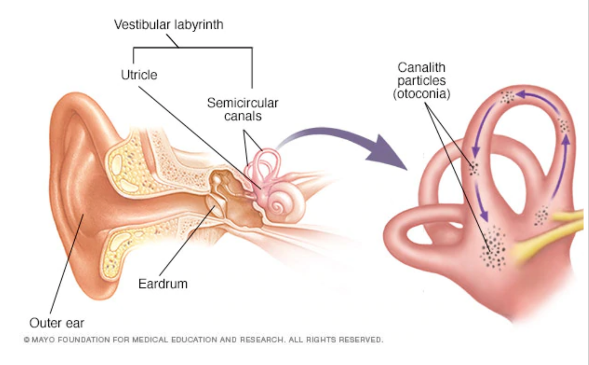Benign Paroxysmal Positional Vertigo (BPPV) is one of the most common causes of dizziness.
- Benign- not life-threatening
- Paroxysmal- symptoms come in sudden but brief spells
- Positional- symptoms are triggered by specific head positions
- Vertigo- an incorrect feeling of spinning
Vertigo: sensation of moving when staying still. Often associated with nausea, feeling that the room is spinning, feeling of being unbalanced or unsteady, swaying, being pulled over in a certain direction, headache, and/or hearing changes.
BPPV is typically triggered by a change in head position. For example: moving your head to look up or down, laying down in bed, turning over, or sitting up out of bed. Symptoms of BPPV will come and go and usually last less than a minute per event, but feelings of unsteadiness or sickness can last longer.
Predisposing factors of BPPV include: head trauma, inner ear disease (such as Labyrinthitis or Meniere’s disease), osteoporosis, prolonged ear dependency, and a genetic component. Often though, the exact cause of BPPV is not known.
Within the inner ear there are 3 semicircular canals that contain fluid and motion sensing hairs. They monitor rotation of  your head. There are also structures called otolith organs that contain tiny calcium crystals in a pouch-like structure located at the center of your inner ear. If these crystals become dislodged and a person has a sudden change in head position, these crystals may become stuck in one of the 3 semicircular canals and disrupt the canal’s sense of position. This can cause symptoms of dizziness, leaving you feeling as though you’re spinning or the room around you is spinning even after your head has stopped moving.
your head. There are also structures called otolith organs that contain tiny calcium crystals in a pouch-like structure located at the center of your inner ear. If these crystals become dislodged and a person has a sudden change in head position, these crystals may become stuck in one of the 3 semicircular canals and disrupt the canal’s sense of position. This can cause symptoms of dizziness, leaving you feeling as though you’re spinning or the room around you is spinning even after your head has stopped moving.
Diagnosis: medical imaging will not identify BPPV, but a trained physical therapist can perform specific tests to determine if BPPV is the cause of a patient’s dizziness.
Treatment: a skilled physical therapist, such as those at Advantage Rehab, can identify which canal to treat, and often through a positional sequence of the head, can place crystals back where they belong and resolve symptoms. Frequently this can be addressed during the first treatment but may take 2-3 visits. One note to make is that BPPV often returns months or years after resolution and may need re-treatment.